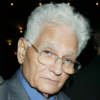Jacques Derrida

Jacques Derrida
Jacques Derridawas a French philosopher, born in Algeria. Derrida is best known for developing a form of semiotic analysis known as deconstruction, which he discussed in numerous texts, and developed in the context of phenomenology. He is one of the major figures associated with post-structuralism and postmodern philosophy...
ProfessionPhilosopher
Date of Birth15 July 1930
believe perception desire
Contrary to what phenomenology- which is always phenomenology of perception- has tried to make us believe, contrary to what our desire cannot fail to be tempted into believing, the thing itself always escapes.
i-can can-do ifs
If I only did what I can do, I wouldn't do anything
memories philosophy reading
There is no rigorous and effective deconstruction without the faithful memory of philosophies and literatures, without the respectful and competent reading of texts of the past, as well as singular works of our own time. Deconstruction is also a certain thinking about tradition and context. Mark Taylor evokes this with great clarity in the course of a remarkable introduction. He reconstitutes a set of premises without which no deconstruction could have seen the light of day.
mean survival term
Survival in the conventional sense of the term means to continue to live, but also to live after death.
mean play differences
1) Différance is the systematic play of differences, of the traces of differences, of the spacing by means of which elements are related to each other. This spacing is the simultaneously active and passive (the a of différance indicates this indecision as concerns activity and passivity, that which cannot be governed by or distributed between the terms of this opposition) production of the intervals without which the "full" terms would not signify, would not function.
eye writing self
I would like to write you so simply, so simply, so simply. Without having anything ever catch the eye, excepting yours alone, ... so that above all the language remains self-evidently secret, as if it were being invented at every step, and as if it were burning immediately
education play waiting
Within the university... you can study without waiting for any efficient or immediate result. You may search, just for the sake of searching, and try for the sake of trying. So there is a possibility of what I would call playing. It's perhaps the only place within society where play is possible to such an extent.
simple ifs simple-words
If things were simple, word would have gotten around.
To pretend, I actually do the thing: I have therefore only pretended to pretend.
together-again world latter
I’m no good for anything except taking the world apart and putting it together again (and I manage the latter less and less frequently).
school long sickness
I have always had school sickness, as others have seasickness. I cried when it was time to go back to school long after I was old enough to be ashamed of such behavior.
trying answers firsts
I was wondering myself where I am going. So I would answer you by saying, first, that I am trying, precisely, to put myself at a point so that I do not know any longer where I am going.
real tension dies
I say things that contradict each other, that are in real tension with each other, that compose me, that make me live, and that will make me die.
eye essence sight
The blindness that opens the eye is not the one that darkens vision. Tears and not sight are the essence of the eye.